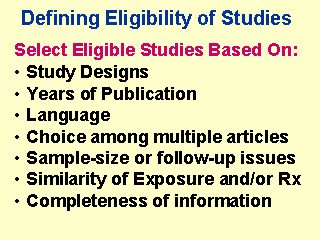 |
 |
front |1 |2 |3 |4 |5 |6 |7 |8 |9 |10 |11 |12 |13 |14 |15 |16 |17 |18 |19 |20 |21 |review |
|
Search for most updated materials ↑
Try to be as up-to-date as possible. Mention the cut-off dates in the analysis
so that it becomes clear that studies that were published before and after the time
mentioned were not missed but not included in the study as part of the design. If you are
including only English language articles in the study, mention the rationale for doing so.
Importantly, if you are faced with multiple reports published from the same study on
similar topic, include only one study so that information from the same study population
should contribute ONLY ONCE to the analysis. Try to exclude studies with small sample size to avoid overemphasizing small studies.
Similarly, make an early decision about the period of follow up of studies. More of these
in the sensitivity analysis. Decide early on whether you are going to include studies with similar exposures or
outcomes in your analysis. Base this decision on your experience and understanding of the
research question. Remember, if you are too restrictive, you gain face validity, though
you may end up omitting important studies. |
